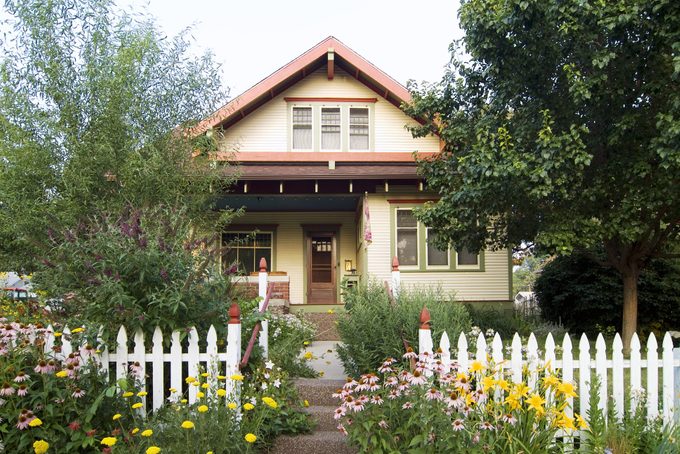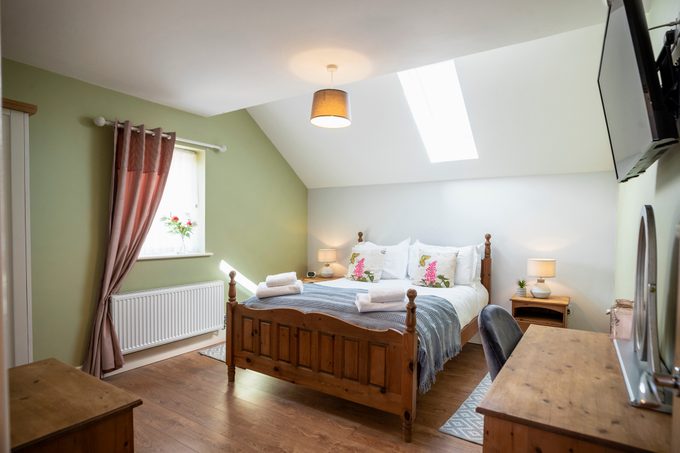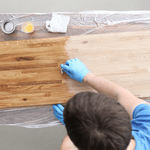How To Start an Airbnb Business

Hosting your home on Airbnb can be lucrative, especially for DIYers. Here, real owners share insights about starting an Airbnb business.
Airbnb, the popular vacation rental website, began with three guests in the founders’ living room. Although Airbnb is now worth billions and includes listings in 220 countries, the original concept remains: Airbnb connects property owners, aka hosts, with travelers needing vacation rentals and temporary housing.
Greg and Kirsty Vitarelli, Airbnb owners of this mountain getaway in Monroe, Massachusetts, bought the property as a family ski retreat during the COVID-19 pandemic. Because the house sat empty for much of the year, the Vitarellis started thinking about passive income. They decided to put the property on Airbnb.
Their first year hosting netted $9,000, and that didn’t include ski season when the Vitarelli family used the property.
“We were astonished, really, at the amount of income it generated for us,” Greg Vitarelli says.
Individual revenues depend on many factors, but a typical Airbnb host makes almost $14,000 per year according to 2021 data released by Airbnb. That’s up a whopping 85% from 2019, and the vacation rental market shows no signs of slowing down.
Have you considered starting an Airbnb business? Here’s what you need to know:
On This Page
Buying an Airbnb
Before you can start your Airbnb business, you need a property. Russell Brandon, a real estate investor and Airbnb owner, says renovating an older property gives the most return on investment if you can do the rehabbing yourself — a DIYer’s dream.
“This is maximum profit,” Brandon says. “If you don’t know how to do the construction yourself, you need good, knowledgeable contractors that you can trust and depend upon that won’t take you to the bank.”
If renovation isn’t an option, prepare to pay a little more for a move-in ready property. Look for up-and-coming neighborhoods with lots of potential, and check out amenities within easy driving distance. Vitarelli’s Airbnb is near the tourist-friendly Massachusetts Museum of Contemporary Art, and the weekend of a nearby music festival books up a year in advance.
“It’s really good to know what’s going on in other communities, so you can bring that into your income,” Vitarelli says. Brandon puts it this way: “Location. Location. Location.” His fourplex near downtown Houston sits two blocks from a university campus, and the arts-and-culture filled neighborhood boasts a walkability score of 97.
Before signing on the dotted line, check local laws and ordinances to make sure short-term rentals are allowed. Airbnb offers information about some city regulations on their Responsible Hosting page, but research the specifics of your location yourself. Check local and county websites, be aware of any city council proposals regarding short-term rentals and don’t forget about HOA bylaws.
Airbnb Owner Considerations
So you have the property and you’re ready to give hosting a try. Airbnb offers lots of resources to get you started, and it’s free to list your property.
Don’t jump in too fast, though. Do your research before listing so you’re not surprised by regulatory requirements or requests from guests.
Local or state regulations
If you’re buying a property to use as an Airbnb, research local laws before signing. If you’re converting a home you already own, verify you can use the property as an Airbnb before hanging up your shingle.
Many municipalities require a rental inspection, and you may have to register your small business with the state. For the inspection, you might need to show blueprints of the home, prove the wiring is up to code or demonstrate that the property is safe for children. Railing height is a common safety issue.
Taxes and incorporating
Brandon operates his properties as limited-liability corporations (LLC), which protect his personal assets in the event something happens to the business or property. Incorporating also has tax implications, so check with your financial advisor or attorney if you’re not confident navigating that world yourself.
Hosting choices
What kind of host do you want to be? Will you be hands-off but always available, operating mostly through email or text? Do you want to meet the guests at check in? What perks will you offer? Will you have requirements of your guests, like doing the dishes or picking up after their dogs?
Communicate with your guests up front to avoid misunderstandings or confrontations later.
Pricing an Airbnb
Figuring out how much to charge for your property can be trial and error, according to Vitarelli.
Airbnb’s website features an earnings estimator that analyzes the past 12 months of booking data for similar properties in your area, giving you a rough idea of what you could charge. Vitarelli started there, but ended up adjusting the rate based on the nuances of the property and area amenities.
AirDNA is another website that offers data and analytics on the short-term rental market. Create a free account to explore properties on the map, compare average daily rates and general market trends. Other features, like revenues of individual properties and seasonal trends, are available with an upgrade.
Be fair, says Brandon. “You have to be reasonable in your rents,” he says.
Then there’s the question of offering long-term or short-term rentals. Brandon likes them both. Vitarelli prefers short-term guests. You can generally get higher rates for short-term rentals, but there’s more upkeep and turnaround.
Airbnb Upkeep and Maintenance
All properties require maintenance, but Airbnb properties need special attention. Guests will not be shy about writing a review if the place isn’t up to snuff.
“You kind of live and die by the customer review,” Vitarelli says. “We wait with bated breath for those reviews, and you’re only as good as the latest one.”
Here’s how to keep things running smoothly:
Hire a cleaner
“Get a good cleaner that you can trust and count on,” Vitarelli says.
The first couple of times Vitarelli and his family hosted, they cleaned the place themselves, with mixed results. The first guests were perfectly happy. But the next review was a little more pointed, and it stung. They decided to hire a professional on referral from another property owner in the area. It’s been smooth sailing ever since.
Fix things when they break
Vitarelli says always be prepared for things to break, and plan to constantly fix things. Brandon says typical upkeep includes appliance repair, plumbing problems and maintaining curb appeal.
Whether you’re an experienced DIYer or you don’t know a hammer from a hacksaw, maintain a fund to pull from if the water heater breaks or one of your renters throws a party and trashes the place.
Most important: Be available. Vitarelli says this isn’t the kind of gig where you can jet off to the Bahamas and hope for the best. If your house floods and the renter can’t reach you, count on a bad review. Not to mention, the damage your property incurs will increase the longer you’re unreachable.
Plan for the future
You don’t have a crystal ball, but plan for capital improvements like a new roof, Brandon says. Put costly kitchen and bath renovations on that planning list, too.
How much to save depends on the condition of your property, and your DIY inclinations and abilities. The average cost of a kitchen remodel is $45,000, according to the 2022 Remodeling Impact Report, a joint study released by the National Association of Realtors and the National Association of the Remodeling Industry. So plan ahead.





